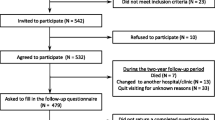Abstract
The aim of the study was to explore the influence of psychological affective states such as cheerfulness and bad mood on self-reported disease activity in patients with ankylosing spondylitis (AS) while controlling for demographic and clinical variables. Patients attending a biological therapy unit were selected for a cross-sectional study if they met the criteria for AS and were already receiving treatment. Their psychological affective state was assessed with the state version of the State-Trait Cheerfulness Inventory. Clinical variables included were patient-reported disease activity using the Bath Ankylosing Spondylitis Disease Activity Index (BASDAI) and acute-phase reactants. We performed univariate and multivariate analyses to verify the robustness of the relationship between psychological affective states and disease activity. We also explored whether disease activity, measured either by self-report or by acute-phase reactants, was influenced by patient’s overall affective state. In the recruited 31 patients with AS, overall affective state contributed significantly to the variance in BASDAI scores, adding 21.8 % to the overall R-square of the predictive power of clinical and demographic variables (combined R-square = 17 %). A higher positive affective state was associated with lower values of C-reactive protein (p < 0.05). Results of a bootstrapping procedure showed that the relationship between C-reactive protein levels and BASDAI scores was mediated by overall affective state. In patients with AS, affective state can induce variability in self-reported disease activity. Patients’ overall affective state can explain the relationship between acute-phase reactants and self-reported scores. These findings suggest interesting possibilities for the monitoring of disease activity in AS.

Similar content being viewed by others
References
Ward MM (1998) Quality of life in patients with ankylosing spondylitis. Rheum Dis Clin North Am 24:815–827
Bodur H, Ataman S, Rezvani A et al (2011) Quality of life and related variables in patients with ankylosing spondylitis. Qual Life Res 20:543–549. doi:10.1007/s11136-010-9771-9
Martindale J, Smith J, Sutton CJ et al (2006) Disease and psychological status in ankylosing spondylitis. Rheumatology 45:1288–1293. doi:10.1093/rheumatology/kel115
Brionez T, Assassi S, Reveille JD et al (2009) Psychological correlates of self-reported functional limitation in patients with ankylosing spondylitis. Arthritis Res Ther 11:R182. doi:10.1186/ar2874
Brionez TF, Assassi S, Reveille JD et al (2010) Psychological correlates of self-reported disease activity in ankylosing spondylitis. J Rheumatol 37:829–834. doi:10.3899/jrheum.090476
Turner MA, Andrewes DG (2010) The relationship between mood state, interpersonal attitudes and psychological distress in stroke patients. Int J Rehabil Res 33:43–48. doi:10.1097/MRR.0b013e32832e98ca
Finch JF, Baranik LE, Liu Y et al (2012) Physical health, positive and negative affect, and personality: a longitudinal analysis. J Res Pers 46:535–537. doi:10.1016/j.jrp.2012.05.013
White DK, Keysor JJ, Neogi T et al (2012) When it hurts, a positive attitude may help: association of positive affect with daily walking in knee osteoarthritis. Results from a multicenter longitudinal cohort study. Arthritis Care Res 64:1312–1319. doi:10.1002/acr.21694
Papousek I, Schulter G (2010) Don’t take an X for a U. Why laughter is not the best medicine, but being more cheerful has many benefits. In: Wells IE (ed) Psychological well-being. Nova Science Publishers, Hauppauge NY, pp 1–75
Ruch W, Köhler G (2007) A temperamental approach to humor. In: Ruch W (ed) The sense of humor: explorations of a personality characteristic. Mouton de Gruyter, Berlin, pp 203–228
Van der Linden S, Valkenburg HA, Cats A (1984) Evaluation of diagnostic criteria for ankylosing spondylitis: a proposal for modification of the New York criteria. Arthritis Rheum 27:361–368
Garrett S, Jenkinson T, Kennedy LG et al (1994) A new approach to defining disease status in ankylosing spondylitis: the bath ankylosing spondylitis disease activity index. J Rheumatol 21:2286–2291
Haywood KL, Garratt A, Jordan K et al (2002) Disease-specific, patient-assessed measures of health outcome in ankylosing spondylitis: reliability, validity, and responsiveness. Rheumatology (Oxford) 41:1295–1302
Carretero-Dios H, Eid M, Ruch W (2011) Analyzing multitrait-mulitmethod data with multilevel confirmatory factor analysis: an application to the validation of the State-Trait Cheerfulness Inventory. J Res Pers 45:153–164. doi:10.1016/j.jrp.2010.12.007
Ruch W, Köhler G, van Thriel C (1997) To be in good or bad humor: construction of the state form of the state-trait-cheerfulness-inventory–STCI. Pers Individ Dif 22:477–491
Fitzgerald GK, White DK, Piva SR (2012) Associations for change in physical and psychological factors and treatment response following exercise in knee osteoarthritis: an exploratory study. Arthritis Care Res 64:1673–1680. doi:10.1002/acr.21751
Riddle DL, Dumenci L (2013) Self-rated health and symptomatic knee osteoarthritis over three years: data from a multicenter observational cohort study. Arthritis Care Res 65:169–176. doi:10.1002/acr.21661
Spoorenberg A, Van Tubergen A, Landewé R et al (2005) Measuring disease activity in ankylosing spondylitis: patient and physician have different perspectives. Rheumatology (Oxford) 44:789–795
Carretero-Dios H, Benítez I, Delgado-Rico E et al (2014) Temperamental basis of sense of humor: the spanish long form of the trait version of the state-trait-cheerfulness-inventory. Pers Individ Dif 68:77–82. doi:10.1016/j.paid.2014.03.045
Zweyer K, Velker B, Ruch W (2004) Do cheerfulness, exhilaration, and humor production moderate pain tolerance? a FACS study. Humor Int J Hum Res 17:85–119. doi:10.1515/humr.2004.009
Acknowledgments
We would like to thank the patients of the Biological Therapy Unit of the Rheumatology Service of Reina Sofía Hospital in Cordoba, Spain, for their participation in this study as well as all the nurses who cooperated in this research.
Conflict of interest
None of the authors have any conflict of interests or financial interests to report regarding this manuscript.
Author information
Authors and Affiliations
Corresponding author
Rights and permissions
About this article
Cite this article
Domínguez, C.J.D., Ugalde, P.F., Vilchez, D.R. et al. Positive and negative affective states and disease activity in ankylosing spondylitis. Rheumatol Int 35, 519–524 (2015). https://doi.org/10.1007/s00296-014-3107-y
Received:
Accepted:
Published:
Issue Date:
DOI: https://doi.org/10.1007/s00296-014-3107-y



